At the dawn of civilization some 300,000 years ago hunters and gatherers returned to their clans with stories of great deeds performed in the daily hunt. This is also when fake news was invented.
Many thousands of years passed bringing us town criers and the invention of newspapers. Here we are today working in high-tech radio newsrooms that inhale information through multiple digital sources and spew it to our listeners almost immediately. (Except when news happens at night or on weekends or holidays, of course. That’s another column or six.)
One thing about news hasn’t changed over the hundreds of millennia since Fred Flintstone brought home the Bronto burgers: the news purveyor still decides what you’ll be told.
What is news? Who decides what your listeners want to know? It’s a head-scratcher. Always has been.
Some years ago, I was in a meeting with my morning all-news co-host and our program and news directors. The ND wondered why we hadn’t mentioned a particular international story that morning. My partner and I both replied that it was boring, and nobody cared. The news boss argued that though it might be of limited interest to most of our listeners at the moment we should do it because “It’s important.”
I don’t remember what that particular story was about but it’s a great example of conversations I’ve had in newsroom meetings and off-air in the studio countless times. I’ve never known who’s right in these value judgments. In this case, the PD ruled that we, the “talent”, had a better sense of listener interest though it could grow with more attention from other outlets. And that’s the crux of the issue, isn’t it? Should you report a world or national story because the networks are doing it? Should something be reported simply because it’s a local story?
The obvious answer is no, but they’re difficult temptations to resist for one very good reason: in every case, we can only guess at the answer. I suppose saying our judgments are valid because we’re experienced professionals would be better than saying we guess, but is it really?
Years ago, radio news was presented in defined blocks: world, national, state, and local. Then individual stations began paying for serious research. (The radio world would be a much better place if that was still true. Another future column.) The research professionals did their thing and then flew into town and told us, “Look at this pie chart; world news is killing you. And, by the way, people are also tuning out when you do stock market reports.”
(I think we were also told we were overdoing the Milli Vanilli story at the time. That was true.)
This was all vital information, but it resulted in an overcorrection away from world news, including what my ND would call “important” stories, to a hyper-focus on local news. It took a while but when the research experts returned, we learned that maybe we had gone too far when we started reporting convenience store heists and overnight apartment fires.
Who decides what is news?
The ultimate answer should be the consumer. But which one?
With all our handwringing over the future of AI, a lot of people seem inclined to throw the baby out with the bath water. If that’s you, stop it. AI is a tool, not a creator. It doesn’t think, it computes and can be combined with algorithmic technology to do exactly what you already do every day with your personal music selection: choose the songs and styles you want to hear and reject the ones you don’t. It learns you. Isn’t that a good thing?
Let’s imagine that (fictional) station ALL NEWS 97.2 gives you an online menu that allows you to select the types of news stories you want to hear. It will take into account your location and any others you’d like to follow. Get as specific or general as you wish with every category of news you can imagine: world, regional, local, sports, weather, business, entertainment, lifestyle, people stories, etc. The online audio feed will give you exactly what you ask for, constantly updated news written and delivered by real people. The flow of the show will be tied together by an AI voice, but the stories will be gleaned, written, and delivered by honest-to-God humans in his and her voice and conversational style.
Yes, I did say “the online feed.” What happens on the broadcast channel? Hard to say but I imagine it will, at first anyway, be the best option for people who want to hear it all. That will continue to be formatted by living programmers who understand audience tendencies.
Look, I’m just making this up as I go. As I’ve said before I’m not the smartest guy in any room, but it doesn’t take a lot of foresight to guess this is where we’re going. For all I know it’s already being done and much better than I’m dreaming it.
Back to the original question: what is news and who decides it?
The program and news directors I’ve spoken with agree that the answer is the listener should decide.
Robin Bertolucci, PD of KFI, Los Angeles:
“Our job isn’t to make anybody interested in anything. Our job is to talk to them about things they’re interested in. If we’re doing our jobs right, we’re talking with them about the things they’re already curious about that they want to know more about. If they’re not interested in (the fighting in) Gaza we probably shouldn’t cover it any more than just a few headlines in the news.”
It’s a great answer but it still begs the question, who decides what listeners want to hear?
Again, Robin Bertolucci:
“I think the more you can know your local audience the more you can know what interests them and really try to hone in on who they are and what lives they’re living, what kind of experiences are they going through, what kind of challenges are they having in their personal lives, whether it’s traffic or crime in their community or fear about their children’s schools and what is going on with them and digging into that. And I think part of that just comes from being a part of the community and really knowing what’s going on. I try to hire people that get that.”
You can’t argue with success. KFI knows its audience. Many stations do, of course. But when you come right down to it the answers to the question are always subjective.
What is news and who decides it?
The only answer is you, the radio news professional, decide. It’s as perfectly imperfect as humans can ever hope to be.
But modern technology, algorithms, and AI can improve on imperfection. The best of both worlds is achievable if we simply embrace the possibilities.
If you love radio news you’re living in the greatest time in history.









